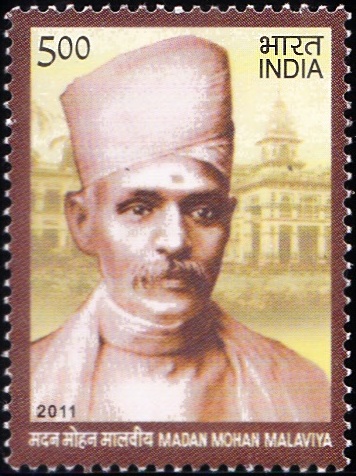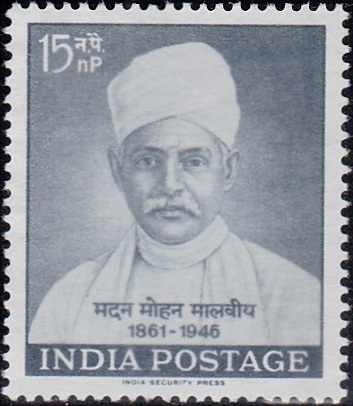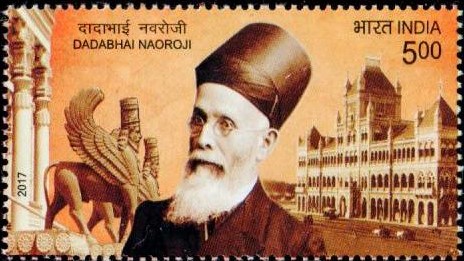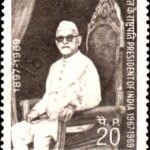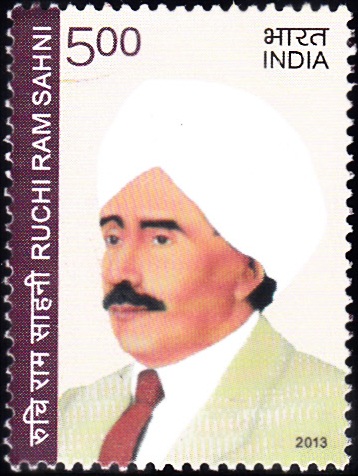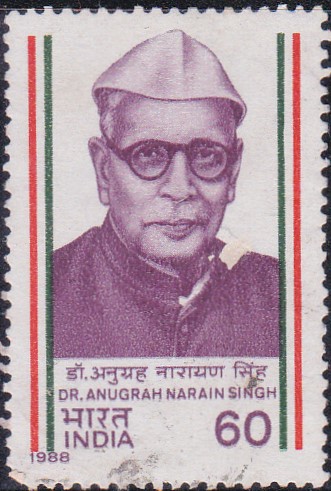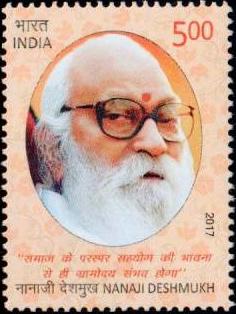
Nanaji Deshmukh
A commemorative postage stamp on Nanabhai Deshmukh, an Indian social activist from Rashtriya Swayamsevak Sangh (RSS) :
 Issued by India
Issued by India
Issued on Oct 11, 2017
Issued for : Department of Posts is pleased to release a Commemorative Postage Stamp on Nanaji Deshmukh.
Credits :
Stamp/FDC/Brochure/Cancellation Cachet : Smt. Nenu Gupta
Type : Stamp, Mint Condition
Colour : Multi Colour
Denomination : 500 Paise
Stamps Printed : 0.5 million
Printing Process : Wet Offset
Printer : Security Printing Press, Hyderabad
Name : Chandikadas Amritrao Deshmukh
Born on 11 Oct, 1916 at Kadoli, Hingoli district, Maharashtra, India
Died on 27 Feb, 2010 at Satna, Madhya Pradesh, India
About :
- Nanaji Deshmukh also known as Chandikadas Amritrao Deshmukh was born on 11 October 1916 in Kadoli, a small town in the Hingoli district of Maharashtra to Amritrao Deshmukh and Rajabai Amritrao Deshmukh. At an early age, he lost his parents and was brought up by his maternal uncle. His early life was full of strife and struggle, however, he grew up to become a dedicated social activist and also worked in the fields of education, health and rural self-reliance. He was honoured with the Padma Vibhushan.
- Nanaji Deshmukh became inspired by Lokamanya Tilak and his nationalist ideology. He was also in close association with eminent leaders such as Dr. Keshav Baliram Hedgewar and Deen Dayal Upadhyaya who he met for the first time in the year 1940. In 1947, on the launch of two journals, Rashtradharma and Panchjanya, and a newspaper called Swadesh, Shri Atal Bihari Vajpayee was assigned the responsibility of the editor and Deen Dayal Upadhyaya was made the Margdharshak with Nanaji as the managing director.
- Nanaji Deshmukh was given the charge of Bharatiya Jan Sangh in Uttar Pradesh as General Secretary. Deshmukh’s groundwork was a great help in strengthening Bhartiya Jan Sangha (BJS) at the grass roots. By 1957 BJS had established its units at each and every district in Uttar Pradesh and credit for this goes to Nanaji who had extensively travelled all over the state and put in a lot of hard work.
- Nanaji Deshmukh also actively participated in Bhoodan Movement started by Vinoba Bhave. He spent two months with Vinoba, and was greatly inspired by the success and appeal of the movement. Later, when Jayaprakash Narayan gave the call for “Total Revolution”, Nanaji responded by giving total support to this movement. Nanaji Deshmukh was elected in 1977 from Balrampur Lok Sabha constituency of Uttar Pradesh. He was offered a Cabinet portfolio which he declined.
- In 1980, when he turned 60, he opted out of politics, devoting himself completely to social and constructive work, living in ashrams and keeping a low profile. He did pioneering work towards anti-poverty and minimum needs programmes. Other areas of his work were agriculture and cottage industry, rural health and rural education. Nanaji assumed chairmanship of the Deendayal Research Institute (DRI) which he had founded in 1972 to validate the philosophy of Integral Humanism propounded by Pandit Deendayal Upadhyaya. Integral Humanism gave a vision for Bharat that with an approach to man and his relationship to society that is integral and complementary could transform India turning it into a self-reliant and compassionate example for the world to follow.
- Nanaji propounded a model for the development of rural areas on the basis of Integral Humanism. After initial experiments in Gonda (U.P.) and Beed (Maharashtra), Nanaji fine-tuned a program that would cover health, hygiene, education, agriculture, income generation, conservation of resources, and social conscience, that is both sustainable and replicable. The vision of the project was ‘Total transformation through total development with people’s initiative and participation’. He was also instrumental in carrying out social restructuring programme in over 500 villages of both Uttar Pradesh and Madhya Pradesh.
- He finally settled down at Chitrakoot, a holy place on the borders of Uttar Pradesh and Madhya Pradesh. It was in 1969 that Deshmukh had visited Chitrakoot for the first time and was moved to see the condition of the society. He resolved to change the face of Chitrakoot during his lifetime. He established Chitrakoot Gramoday Vishwavidyalaya, India’s first rural University, and served as its Chancellor.
- He was nominated to Rajya Sabha in the year 1999 in recognition of his services to the nation. He was also awarded Padma Vibhushan in 1999. India’s former President A.P.J. Abdul Kalam praised Deshmukh for his “single-minded devotion to the uplift of the people”. He died the age of 94, on 27 February 2010 in the premises of Chitrakoot Gramoday Vishwavidyalaya.
- Text : Based on the material available on internet.
Subscribe
Login
0 Comments


